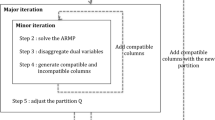Abstract
Column generation (CG) is widely used to solve industrial optimization problems, namely vehicle and crew scheduling problems. This method becomes inefficient and takes huge time to reach an optimal solution for large instances due to degeneracy and the size of the branching tree. Often, finding an integer solution comes very late after several hours of calculation or even days for large crew pairing problems for instance, which is not appreciated in practice. In the present work, we propose a generic framework for distributed integral column generation (DICG) that can yield faster solutions for such problems. Computational tests show that DICG shows excellent results and outperforms DRMH, a distributed version of the well-known restricted master heuristic. DICG yields in minutes optimal or near optimal solutions for difficult instances DRMH cannot solve.







Similar content being viewed by others
Data Availability
Data that support these finding are available upon request from the corresponding author.
References
Dantzig G, Wolfe P (1960) Decomposition principle for linear programs. Oper Res 8:101–111
Desrochers M, Soumis F (1989) A column generation approach to the urban transit crew scheduling problem. Trans Sci 23:1–13
Barnhart C, Johnson EL, Nemhauser GL, Savelsbergh MW, Vance PH (1998) Branch-and-price: Column generation for solving huge integer programs. Oper Res 46(3):316–329
Desaulniers G, Desrosiers J, Dumas Y, Marc S, Rioux B, Solomon M, Soumis F (1997) Crew pairing at Air France. Eur J Oper Res 2:245–259
Hoffman KL, Padberg M (1993) Solving airline crew-scheduling problems by branch-and-cut. Manage Sci 39(6):657–682
Gamache M, Soumis F, Marquis G, Desrosiers J (1999) A column generation approach for large-scale aircrew rostering problems. Oper Res 47(2):247–263
Garey MR, Johnson D (1979) Computers and intractability: a guide to the theory of NP-completeness. W.H. Freeman and Co., San Francisco, USA
Zaghrouti A, Soumis F, El Hallaoui I (2014) Integral simplex using decomposition for the set partitioning problem. Oper Res 62:435–449
El Hallaoui I, Metrane A, Soumis F, Desaulniers G (2011) An improved primal simplex algorithm for degenerate linear programs
Rosat S, Elhallaoui I, Soumis F, Chakour D (2016) Influence of the normalization constraint on the integral simplex using decomposition. Disc Appl Math 217(1):53–70
Rosat S, Elhallaoui I, Soumis F, Chakour D, Lodi A (2017a) Integral simplex using decomposition with primal cutting planes. Math Program
Zaghrouti A, El Hallaoui I, Soumis F (2018) Improving set partitioning problem solutions by zooming around an improving direction. Ann Oper Res
Foutlane O, El Hallaoui I, Hansen P. (2019). Integral simplex with double decomposition for set partitioning problems. Computers & Operations Research. 111:243–257.
Foutlane O, El Hallaoui I, Hansen P (2018) Distributed integral simplex for clustering. Cahiers du Gerad, G-2018-31, HEC Montreal
Balas E, Padberg MW (1975) On the set-covering problem: II. An algorithm for set partitioning. Oper Res 23:74–90
Kernighan BW, Lin S (1972) An efficient heuristic procedure for partitioning graphs. Bell Syst Tech J 49:291–307
Joncour C, Michel S, Sadykov R, Vanderbeck F (2010) Column generation based primal heuristics. Electron Notes Disc Math 36:695–702
Saddoune M, Desaulniers G, Soumis F (2013) Aircrew pairings with possible repetitions of the same flight number. Comput Oper Res 40(3):805–814
Kasirzadeh A, Saddoune M, Soumis F (2017) Airline crew scheduling: Models, algorithms, and data sets. Euro J Trans Logist 6(2):111–137
Haase K, Desaulniers G, Desrosiers J (2001) Simultaneous vehicle and crew scheduling in urban mass transit systems. Trans Sci 35(3):286–303
Rosat S, Quesnel F, Elhallaoui I, Soumis F (2017b) Dynamic penalization of fractional directions in the integral simplex using decomposition: Application to aircrew scheduling. Eur J Oper Res 263:1007–1018
Funding
This study was supported by NSERC, the National Sciences and Engineering Research Council of Canada (grant number RGPIN-2018-05284).
Author information
Authors and Affiliations
Corresponding author
Ethics declarations
Conflict of Interest
The authors declare no competing interests.
Additional information
This article is part of the Topical Collection on Decomposition at 70
Rights and permissions
About this article
Cite this article
Foutlane, O., El Hallaoui, I. & Hansen, P. Distributed Integral Column Generation for Set Partitioning Problems. Oper. Res. Forum 3, 27 (2022). https://doi.org/10.1007/s43069-022-00136-w
Received:
Accepted:
Published:
DOI: https://doi.org/10.1007/s43069-022-00136-w




